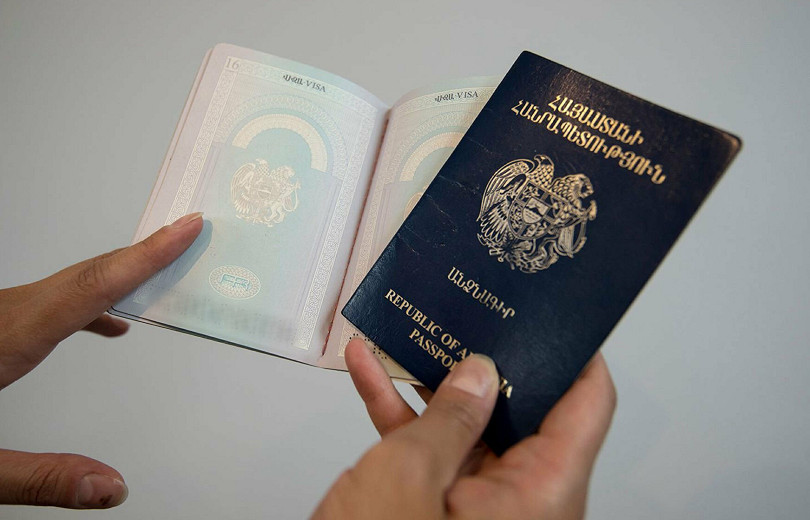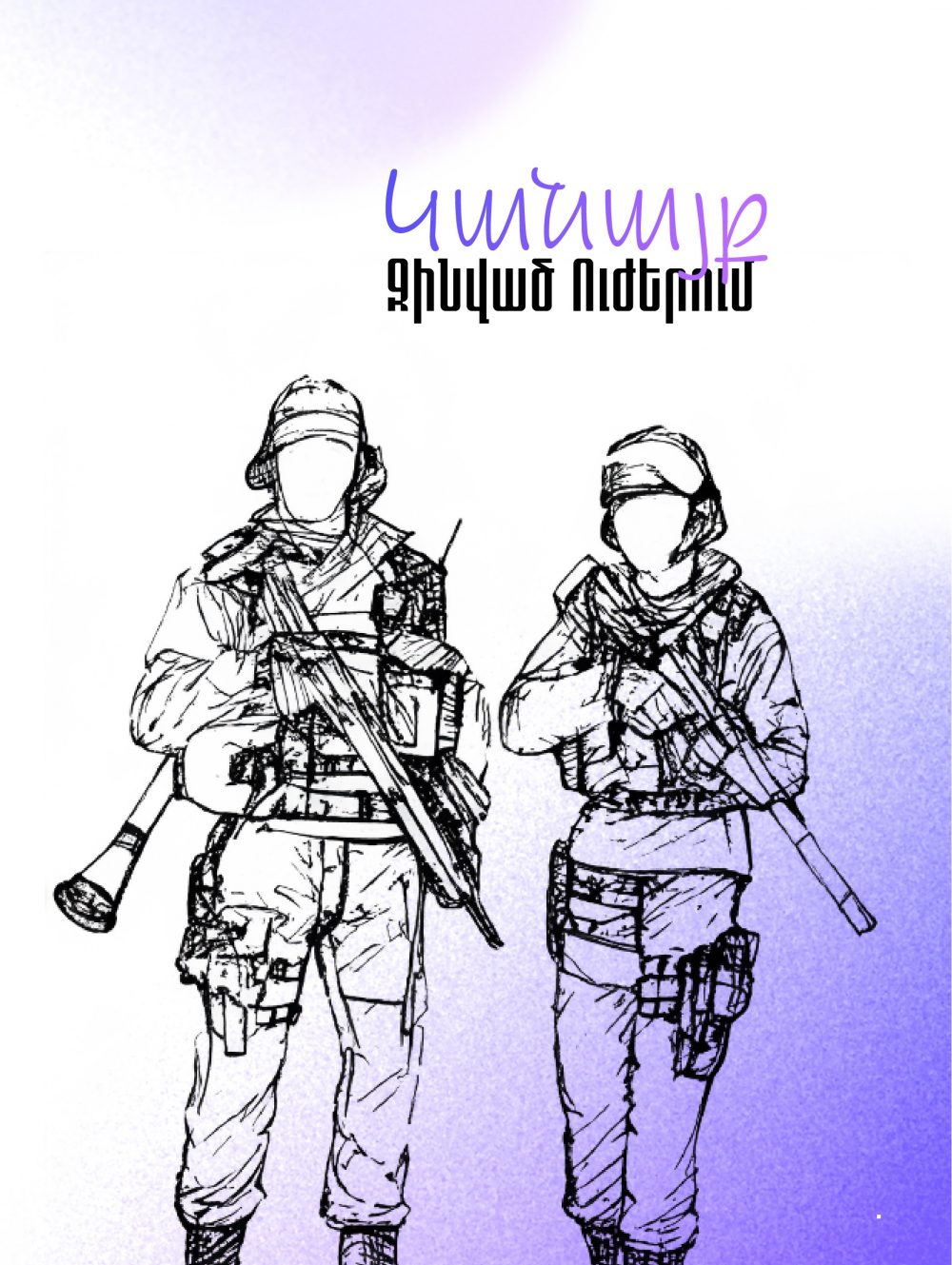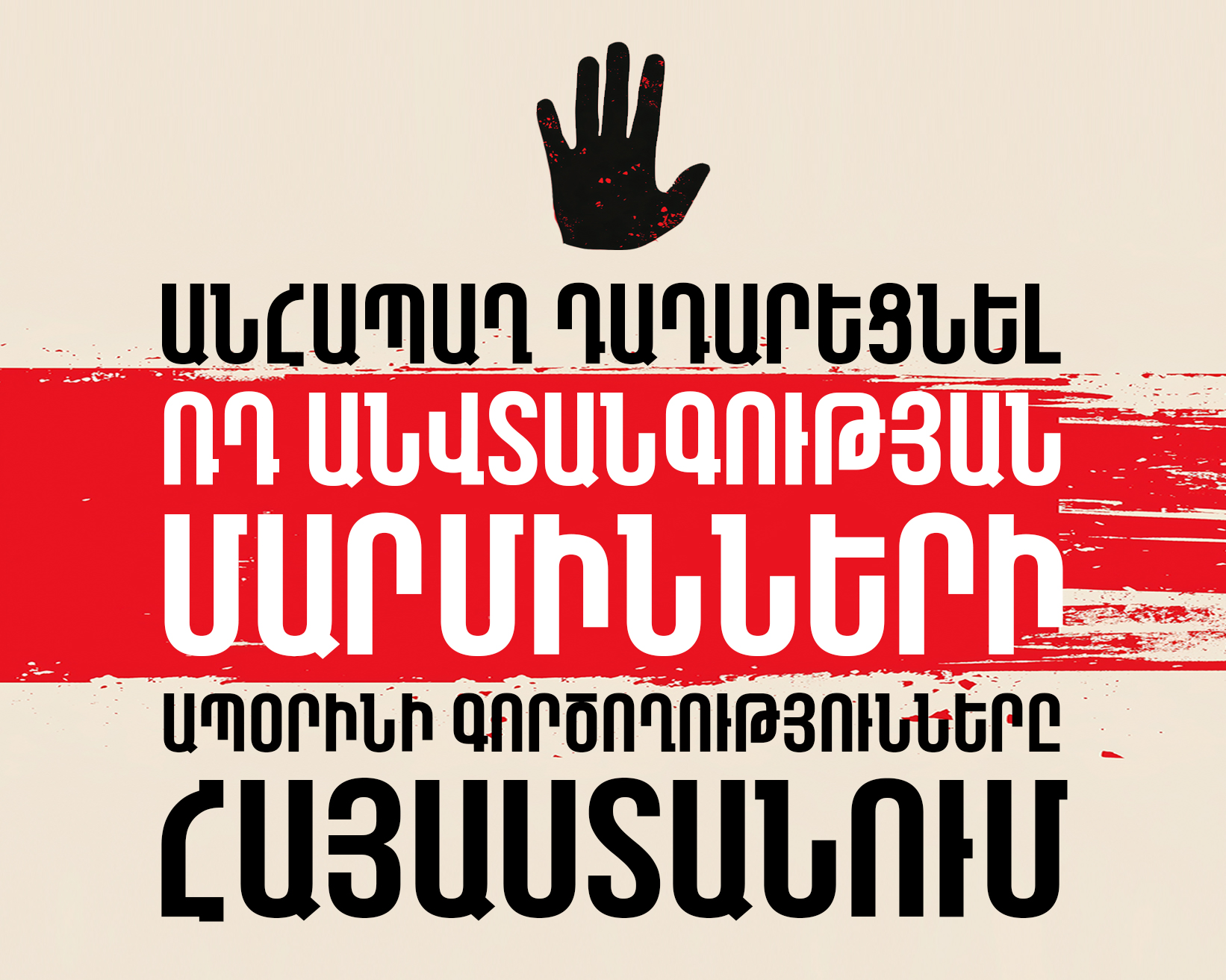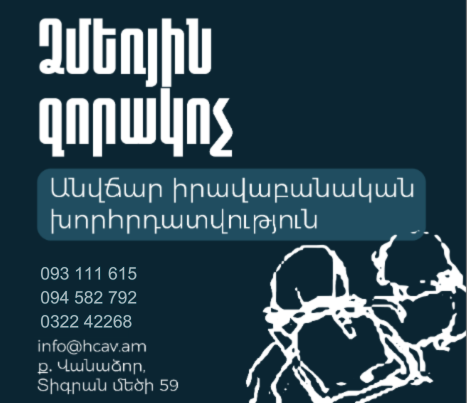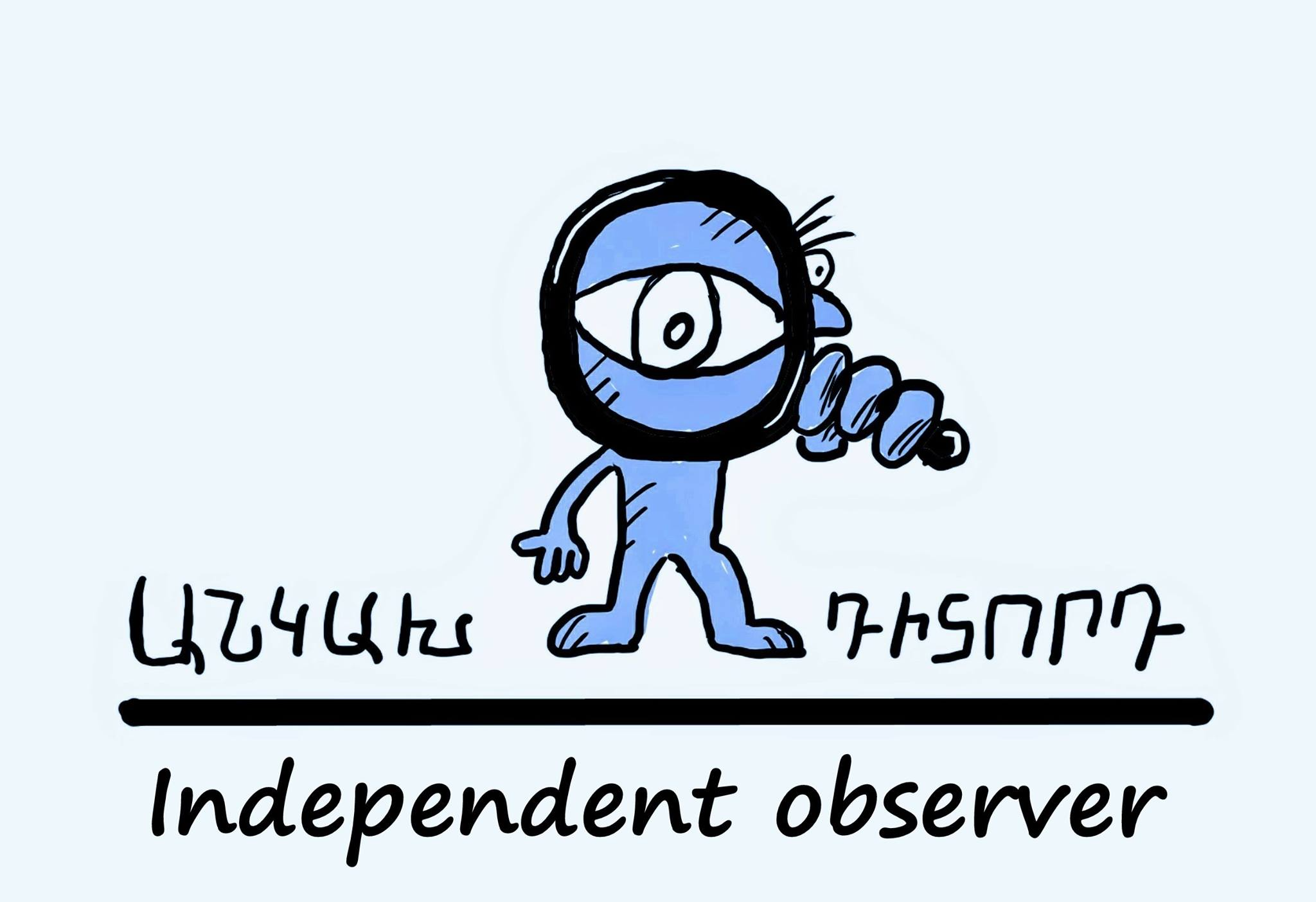




Conduct of the RA Ministry of Defense in terms of providing information
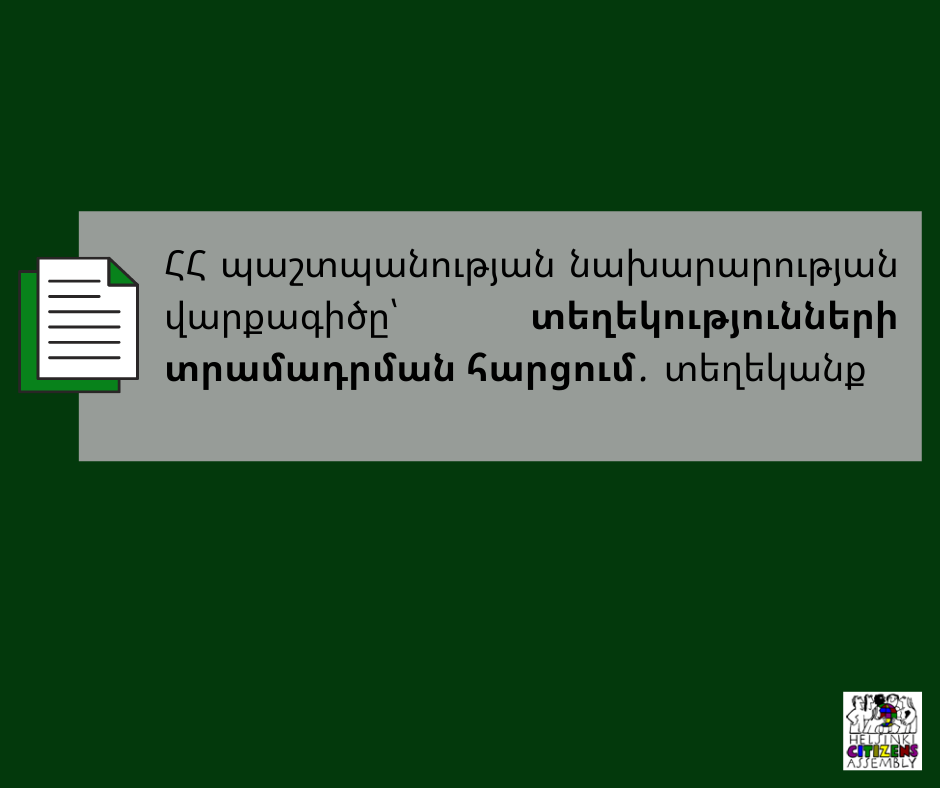
Activities | Reports|Information Papers|Brochures | Publications | State Institutions | Own | Right to Seek and Receive Information | Civilian Oversight and Monitoring
The right to freedom of information is one of the fundamental human rights, and it is important that information possessed by state bodies, including information regarding the national security, be accessible to persons for them to have an opportunity to oversee conduct of state authorities and fully participate in governance of the democratic state.Unlawful restriction of the right to freedom of information will make exercise of other rights essentially difficult: closely related to spheres of public life, exercise of the right to freedom of information sets preconditions for the exercise of other fundamental rights. In confirmation of the aforementioned, just as around the world, the Republic of Armenia adopted legal acts on freedom of information (the RA Law on Freedom of Information), the right to freedom of information was enshrined by the RA Constitution (Article 42 and Article 51) and international legal acts. In the Republic of Armenia, the right to freedom of information is regulated by international legal acts ratified by the RA, RA Constitution, RA Law on Freedom of Information and other legal acts. As a member of a number of international organizations, Armenia signed important international documents on human rights. By that Armenia undertook the obligation to respect human rights, including the right to express and freedom of information.
Helsinki Citizens’ Assembly-Vanadzor (hereafter referred to as ‘’the Organization’’) attaches importance to implementation of civilian oversight over the Armed Forces and the condition that democratic oversight implemented by receiving information of public importance promotes transparency of state authorities’ activities and contributes to accountable activity of state bodies and officials. Thus, continuing to protect human rights in the Armed Forces, the Organization regularly applies to the RA Ministry of Defense (hereafter referred to as ’’the RA MoD’’) requesting to provide information. In this report, we address conduct of the RA MoD when providing information concerning human rights in the context of international principles of national security and the right to information[1] (hereafter referred to as ’’Tshwane principles’’). Tshwane principles are based on international and national laws, standards, best practice and experts’ conclusions. Tshwane principles are more about restrictions of freedom of information from the aspect of ensuring security of a democratic state. All the other grounds invoked by the state for restricting access to information must at least be in line with these standards.
Explaining that it is related to security issues, the RA MoD refuses to provide requested information, maintaining a level of confidentiality that has no justification in terms of the Tshwane principles.
The table below presents content of the Organization’s information requests addressed to the RA MoD in 2021 and the legal grounds invoked by the RA MoD for refusing to provide that information.
|
|
Requested information |
Legal grounds for refusing to provide the information |
|
1. |
Inquiry regarding death cases of servicemen in the second half of 2020 |
Article 8 of the RA Law on Freedom of Information |
|
2. |
Inquiry regarding persons killed (identified or in the phase of identification), injured, and persons missing as a result of the war, as well as prisoners of war |
Article 8 of the RA Law on Freedom of Information, RA Law on Personal Data |
|
3. |
Inquiry regarding the number of female workers in the RA MoD |
Article 9 of the RA Law on State and Official Secret |
|
4. |
Inquiry regarding death cases of servicemen in the first half of 2021 |
Article 8 of the RA Law on Freedom of Information, RA Law on Personal Data |
|
5. |
Inquiry regarding missing persons |
Article 8 of the RA Law on Freedom of Information, RA Law on Personal Data |
|
6. |
Inquiry regarding implementation of combat shifts |
Article 9 of the RA Law on State and Official Secret |
|
7. |
Inquiry regarding citizens enlisted during military training gatherings |
The RA Government decisions N 1590-ՆԳ of 28.09.2020, N 1637-ՆԳ of 05.10.2020, N 1669-ՆԳ of 10.10.2020, N 1765-ՆԳ of 03.11.2020 |
As it can be seen, refusing to provide information requested by the Organization, the MoD mainly invokes Article 8 of the RA Law on Freedom of Information, Article 9 of the RA Law on State and Official Secret and the RA Law on Personal Data (without specifying any legal norm) as legal grounds․ At the same time, the table shows that the Organization requests information concerning official information of public importance, i.e., human rights, gender equality.This means that the MoD refuses to provide the Organization with information which directly concerns human rights and its provision pursues an overriding public interest.
Principle 3 of the Tshwane Principles addresses justification of restricting the right to information on security grounds, ’’No restriction on the right to information on national security grounds may be imposed unless the government can demonstrate that: (1) the restriction (a) is prescribed by law and (b) is necessary in a democratic society (c) to protect a legitimate national security interest; and (2) the law provides for adequate safeguards against abuse, including prompt, full, accessible, and effective scrutiny of the validity of the restriction by an independent oversight authority and full review by the courts’’.
Principle 4 sets a burden on public authority to establish legitimacy of any restriction,
(a) The burden of demonstrating the legitimacy of any restriction rests with the public authority seeking to withhold information.
(b) The right to information should be interpreted and applied broadly, and any restrictions should be interpreted narrowly.
(c) In discharging this burden, it is not sufficient for a public authority simply to assert that there is a risk of harm; the authority is under a duty to provide specific, substantive reasons to support its assertions.
(d) In no case may the mere assertion, such as the issuing of a certificate by a minister or other official to the effect that disclosure would cause harm to national security, be deemed to be conclusive concerning the point for which it is made.
In terms of rules for handling information requests, it should be mentioned that Tshwane principles have specific regulations for that. Principle 18 establishes an obligation for an information holder to consider requests even if information has been classified, as ’’The fact that information has been classified is not decisive in determining how to respond to a request for that information. Rather, the public authority that holds the information should consider the request according to these Principles’’.
Principle 20 establishes duty to state reasons for denial in writing:
(a) If a public authority denies a request for information, in whole or in part, it should set forth in writing specific reasons for doing so, consistent with Principles 3 and 9, within the period of time specified in law for responding to information requests.
(b) The authority should also provide the requester with sufficient information concerning the official(s) who authorized non-disclosure and the process for doing so, unless to do so would itself disclose classified information, and of avenues for appeal, to allow for an examination of the authority’s adherence to the law.
Principle 23 establishes that a public authority that holds information that it refuses to release should identify such information with as much specificity as possible. At the least, the authority should disclose the amount of information it refuses to disclose, for instance by estimating the number of pages.
And principle 26, referring to the right to review of decision of withholding information, establishes that
(a) A requester has the right to a speedy and low-cost review by an independent authority of a refusal to disclose information, or of matters related to the request.
(b) The independent authority should have the competence and resources necessary to ensure an effective review, including full access to all relevant information, even if classified.
(c) A person should be entitled to obtain independent and effective review of all relevant issues by a competent court or tribunal.
(d) Where a court makes a ruling that withholding information is warranted, it should make publicly available fact-specific reasons and its legal analysis in writing, except in extraordinary circumstances, and consistent with Principle 3.
As the aforementioned information shows, in case of not disclosing information, the state body should not only mention the legal grounds for doing so, but should also provide specific reasons for refusing to do so, as well as sufficient and grounded information regarding prohibition to disclose the relevant information, and description of information not subject to disclosure. At the same time, irrespective of the opportunity to appeal non-provision of information in court, an independent body should operate by law, which shall be competent to make a non-biased decision and review state bodies’ activities if they restrict the right to information.
With regard to the RA MoD conduct, we can record that when they restrict the right to information, they only mention the legal ground for non-provision of information (sometimes also without invoking a specific legal norm, as mentioned above) and do not provide reasoned information as to why official information of public importance is not provided. Thus, guided by the above-mentioned principles, we can state that when restricting the right to information, the RA MoD does not present specific and grounded facts.With regard to effective scrutiny of the validity of the restriction by an independent oversight authority as established under Principle 3, we record that no non-judicial body exists in Armenia, and justification of restriction is checked only after an appeal is made to court and a case is initiated, which, however, is not sufficient to check justification and legality of restriction of the right to information, since the practice of maintaining confidentiality will easily expand in the conditions of lack of oversight.
Establishing the rules for considering information requests, Tshwane principles also define the information that can be withheld based on national security, as well as information subject to disclosure. In particular, principle 9 establishes information that legitimately may be withheld.
According to this principle,
(a) Public authorities may restrict the public’s right of access to information on national security grounds, but only if such restrictions comply with all of the other provisions of these Principles, the information is held by a public authority, and the information falls within one of the following categories:
(i) Information about on-going defense plans, operations, and capabilities for the length of time that the information is of operational utility.
(ii) Information about the production, capabilities, or use of weapons systems and other military systems, including communications systems.
(iii) Information about specific measures to safeguard the territory of the state, critical infrastructure, or critical national institutions (institutions essentielles) against threats or use of force or sabotage, the effectiveness of which depend upon secrecy.
(iv) Information pertaining to, or derived from, the operations, sources, and methods of intelligence services, insofar as they concern national security matters; and
(v) Information concerning national security matters that was supplied by a foreign state or inter-governmental body with an express expectation of confidentiality; and other diplomatic communications insofar as they concern national security matters.
b) It is good practice for national law to set forth an exclusive list of categories of information that are at least as narrowly drawn as the above categories.
(c) A state may add a category of information to the above list of categories, but only if the category is specifically identified and narrowly defined and preservation of the information’s secrecy is necessary to protect a legitimate national security interest that is set forth in law, as suggested in Principle 2(c). In proposing the category, the state should explain how disclosure of information in the category would harm national security.
As mentioned above, the Organization requests from the RA MoD information which falls in the category of official information of public importance. Moreover, none of the requested information falls within the category of information listed under principle 9 that can be legitimately withheld by the holder.
This means that non-provision of information requested by the Organization does not stem from implementation of the RA MoD obligations to ensure effectiveness of the state’s activity in the defense sphere, therefore, the RA MoD’s restrictions of public accessibility of information is not justified.
Principle 10, which concerns categories of information with a high presumption or overriding interest in favor of disclosure, lists the types of information, in case of which, public interest is overriding and they are subject to disclosure by the state body that holds the information.
Some categories of information, including those listed below, are of particularly high public interest given their special significance to the process of democratic oversight and the rule of law. Accordingly, there is a very strong presumption, and in some cases an overriding imperative, that such information should be public and proactively disclosed. Information in the following categories should enjoy at least a high presumption in favor of disclosure, and may be withheld on national security grounds only in the most exceptional circumstances and in a manner consistent with the other principles, only for a strictly limited period of time, only pursuant to law and only if there is no reasonable means by which to limit the harm that would be associated with disclosure. For certain subcategories of information, specified below as inherently subject to an overriding public interest in disclosure, withholding on grounds of national security can never be justified.
-
Violations of International Human Rights and Humanitarian Law,
-
Safeguards for the Right to Liberty and Security of Person, the Prevention of Torture and Other Ill-treatment, and the Right to Life,
-
Structures and Powers of Government,
-
Decisions to Use Military Force or Acquire Weapons of Mass Destruction,
-
Surveillance,
-
Financial Information,
-
Accountability Concerning Constitutional and Statutory Violations and Other Abuses of Power,
-
Public Health, Public Safety, or the Environment.
Studying the information in the table, we can see that in terms of information that the Organization requests from the RA MoD (information regarding death cases of servicemen in the Armed Forces; information regarding persons injured, missing and taken captive as a result of the war, etc.), public interest is overriding. Moreover, public interest becomes imperative and overriding over other interests, if the information concerns human rights violations or crimes against humanity.
Information requested by the Organization not only concerns human rights violations and falls within the categories of information subject to provision by the relevant state body in case of an information request, but is also subject to proactive disclosure according to the Principles. Whereas, the RA MoD not only does not publish information regarding human rights violations, but also refuses to provide them upon request.
Summing up, we can record that restriction of information by the RA MoD does not stem from concepts established by international legal documents, as information requests are not considered by the MoD and responses are not provided in line with rules enshrined by Tshwane principles; at the same time, information requested by the Organization does not concern a personal life secret subject to protection, and provision of the information requested by the Organization does not and cannot cause harm to any person’s interests, as it is official information of public importance; information regarding human rights violations is means of justifying the imperative overriding of public interest which is served by information disclosure.
At the same time, we record that in such conditions, an important sphere of public authorities is left out of civilian oversight, and this is incompatible with obligations undertaken by the state to guarantee an accountable and transparent governance, protection of human rights in a democratic society governed by the rule of law; also taking into account that freedom to seek and receive information, i.e., accessibility of public information is an essential precondition for democracy and transparency of state governance responsible to the public.
Recommendations
Summing up the issues identified by this analysis, we recommend
-
To apply legal criteria of classifying information in a reasonable and cautious manner, contributing as much as possible to principles of democratic values and transparency before society;
-
To consider requests for information and provide relevant responses in line with Tshwane principles, presenting the grounds and specific reasons for providing or refusing to provide the requested information;
-
In case of refusing to provide information, besides mentioning legal grounds, to also provide sufficient relevant information regarding the prohibition to disclose information by presenting concrete reasons for refusing to provide the requested information and description of the information not subject to disclosure.
-
To establish an independent oversight body that will be competent to make a full, effective and unbiased decision regarding restriction of the right to information: the independent oversight body must have the competency and resources necessary for effective review, as well as all the necessary information, including competency to receive and examine classified information.
Regarding legislative changes:
To develop legislation as clear as possible regarding information confidentiality in the security and defense spheres by establishing criteria for classifying information,
To make legislation regulating confidentiality of information in line with the legislation related to free access to information,
To make legal acts regulating the right to information in the RA in line with principles and concepts enshrined in international legal acts.
[1] Tshwane principles were developed in Tshwane (South Africa) and published on 12 June 2013 http://archive.hcav.am/publications/the-tshwane-principles/ /translated by HCA Vanadzor




